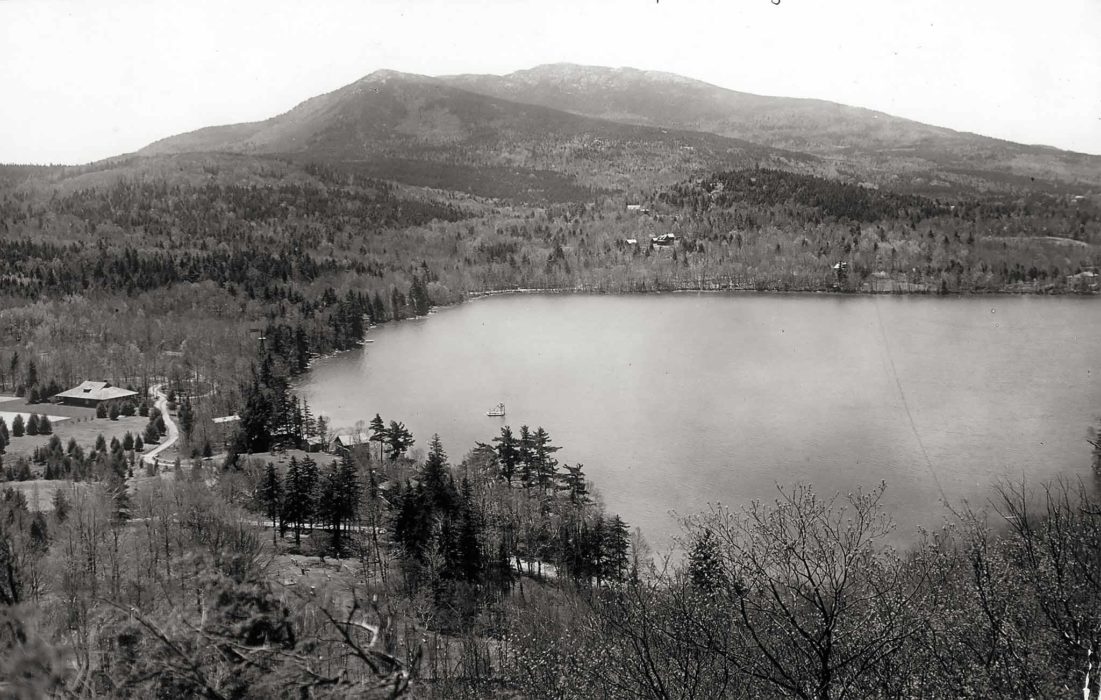IT IS THE AGE of calling cards and formal social visits. Agnes Parsons has called on many people and left many cards in preparation for ‘Abdu’l-Bahá’s visit to Dublin.
On ‘Abdu’l-Bahá’s second day in Dublin, Agnes takes him on a drive through the village in her carriage, along the Jaffrey Road, through MacVeagh Woods, and then out to the Lake. ‘Abdu’l-Bahá and Dr. Fareed, his translator today, stop at the Parsons’ boathouse, while Agnes continues on to the club where she tells the members that her Persian guest has arrived.
On the way home ‘Abdu’l-Bahá makes sure that all bills concerning his stay will be sent to him; he insists on paying his own way in America. Day-Spring has become a home for the seven Persians and some guests, but after a few days ‘Abdu’l-Bahá takes a room down the hill in the village, at the Dublin Inn. Agnes says it’s because he’s not sleeping well in the cooler, windy air; Alice Breed and Dr. Getsinger think he’s tired of being waited on.

Even the children have noticed the man with the long white beard and flowing robes. “The venerable Persian, Abdul Baha,” the Peterborough Transcript writes, “bears so much resemblance to Santa Claus that two little tots begged to take out their go-cart and get it filled with presents from him. They had espied the supposed Santa Claus sitting on the piazza of the Wilcox Inn. . . .”
On the first of August seventy-five people arrive at the Parsons’ to listen to ‘Abdu’l-Bahá’s afternoon talk. When asked if he finds the people interested, he says: “They are very much alive. In this country an old maid of eighty will want to know all about politics.” In America, it seems, everyone wants to know about everything.
So ‘Abdu’l-Bahá settles in for his three-week stay. Although offers of motor car rides abound, he travels mostly by carriage or he walks. The Cabots, the Pumpellys, the Parmalees, and others invite him for lunch. At one home a cook wishes to hear him speak, so her employer tells her to sit out of sight behind a tree: she is black.
Amy Lowell, the poet, writes of Teatro Bambino, Joseph Lindon Smith’s open-air theatre:
How still it is! Sunshine itself here falls
In quiet shafts of light through the high trees
Which, arching, make a roof above the walls
Changing from sun to shadow as each breeze
Lingers a moment, charmed by the strange sight
Of an Italian theatre, storied, seer
Of vague romance, and time’s long history;
Where tiers of grass-grown seats sprinkled with white,
Sweet-scented clover, form a broken sphere
Grouped round the stage in hushed expectancy.

‘Abdu’l-Bahá walks across the lawn at the Teatro and finds a seat. Joe, a painter and archaeologist, fulfills his passion for dramatics by writing plays and performing them here every summer. Soon ‘Abdu’l-Bahá moves to the shade by a tree. Agnes says later that the play was somewhat risqué, and perhaps ‘Abdu’l-Bahá didn’t like it. However, when it’s over ‘Abdu’l-Bahá shakes hands with all the guests and tells Joe that he is a genius.
But ‘Abdu’l-Bahá does not hesitate to say those things which need saying in Dublin. On July 29, during his first afternoon talk at Agnes’s home where her wealthy friends have gathered, he tells them that they will become religious when religion and spirituality become a fad. “They want to be ‘it,’ whatever the fad is,” one listener reports.






